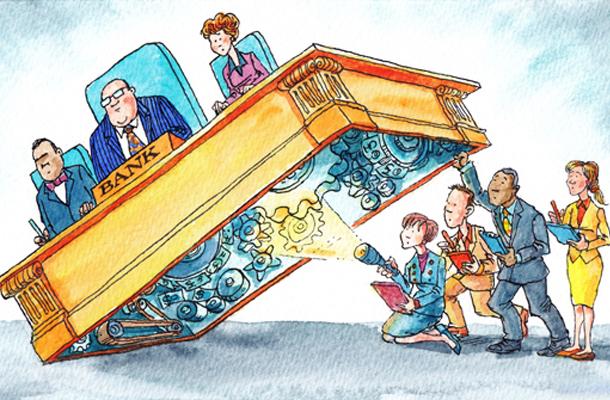What are Financial Journalists For? A Review

Damian Tambini’s article, “What are Financial Journalists For?” (2010) is insightful and worthwhile in framing its argument in terms of how financial journalists themselves understand their role in corporate governance and the broader ethical responsibilities of their profession. Tambini suggests that a better understanding of the laws, regulatory and self-regulatory mechanisms structuring business and financial journalism can help us understand the media’s relative inattention to risks in the banking sector prior to the 2007 credit crisis. The criticism faced by financial and business journalism, however, predates the financial crisis, in general, “financial journalists are criticized for superficiality and for a failure to conduct investigations… and for inappropriate news values… They are criticized for being insufficiently skeptical.” (158)
Furthermore, Tambini cites the increasing complexity of financial objects as beyond the training, education and skills of the average journalist. This complexity, he writes, makes it difficult for financial journalists to contribute in a meaningful way to corporate governance. Moreover, the sources from which journalists receive their information are often interested parties, who grant information on the condition it is presented as they deem fit. All of these criticisms, however,
are of course based on the assumption that financial journalists should play an independent, ‘watchdog’ role. Since this is not a consensus view, even among journalists, it is worth making this explicit. Might the problem not be that markets are increasingly complex, or that journalists are insufficiently funded? Perhaps business and financial journalists themselves do not see themselves as engaged in ‘public interest’ reporting in the same way that political journalists do. (159-160)
There is, Tambini writes, no real consensus among journalists on their wider role in corporate governance and in serving the public interest. Many see their role simply as providing interested investors with market relevant information. What Tambini calls ‘ethical minimalists’ “saw their ultimate responsibility as being to respect the law and serve the shareholders of their companies, not to plug gaps in the system of corporate oversight.” (160-161)
However, the media and the public play an important role in holding corporations, businesses and banks to account. The media also exerts a direct and powerful influence on stock prices and market behaviours. These two systemic views of the role of financial journalists, corporate governance and their relation to capital markets ought to be kept in mind, Tambini writes, in understanding the responsibilities of finance and business journalists. “On the one hand, they indicate a wider watchdog role for journalists in the system of corporate governance; and on the other, they show that the reflexive nature of the relationship with markets requires a particular ethical approach.” (162) These professional rights and responsibilities of financial journalists are themselves also codified in law and self-regulatory codes, particularly with respect to market abuse. Tambini lists responsibilities with respect to insider trading, market manipulation, conflicts of interest, and non-disclosure as examples of such duties codified in law.
The profession of financial journalism, moreover, faces some important challenges that are bound up with their wider ethical and political concerns. New communications technologies play an important role here; an increasing pressure on heightened productivity is purchased at the expense of editorial oversight; “there is a trade-off between speed and attention to ethics and it is one where financial journalism has yet to find a new equilibrium of accepted practices.” (166) I’ve already mentioned the increasing complexity of financial stories and investment products as well. These pressures of speed complexity and productivity have a profound effect on the journalists’ general professional strategies: “to ensure that they are not used in the service of someone else’s interests, but report in the public interest or at least in the interests of their readers.” (167) The public relations industry as a whole imposes important pressures on financial journalism that, according to an interviewed editor, put up barriers to information, releasing information in a ‘carefully orchestrated way.’ “Things are very controlled in a way compared to a way it used to be… the free flow of information has been interrupted and the kind of information we get can be very sanitized. It’s very hard getting to the bottom of a story.” (167) Information is granted, Tambini writes, on the condition that it is released in the required manner.
All these pressures, one might say, cause financial journalists to sideline their ethical responsibilities to the public interest. Some interviewees, Tambini points out, recall a ‘golden age’ of financial journalism where “the professional ethics and responsibility of the profession were fostered and there was the stability to fund more investigations and longer-term risks.” (169) Now, not only are data, information and news increasingly released as a free service online, the decrease in pay for financial journalists skews asymmetrically with the resources of large companies and their PR firms. Furthermore, bloggers, social media and other services have come to undermine traditional financial journalism. Tambini suggests that “online financial news should be separated between online versions and initiatives of old media – which tend to observe the same codes and standards; and pure play online financial news and information. This latter group appears to exist outside the existing framework.” (170)
Tambini’s article does a wonderful job in highlighting some of the reasons for which financial and business journalists might understand their profession as outside the wider ethico-political responsibilities of corporate governance and serving the public interest. I’ve mentioned in another blog post that one of the great strengths of capital is its ability to maintain the metaphysical divorce between the ‘is’ and the ‘ought,’ the ontological and the ethical or normative. Perhaps, then, the step beyond this current impasse might implore journalists, and anyone else in finance and business, to ask themselves almost impossibly difficult questions on the nature of their profession and their place in the global economy.



.gif)